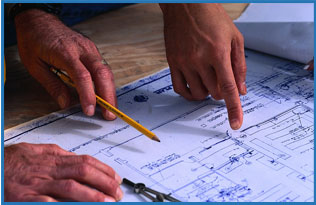POST GRADUATION IN CIVIL - STRUCTURAL ENGINEERING
Lab Details
 |
|
1) Strength of Material – Strength of Materials Laboratory offers facilities for testing building materials for their strength, behavior and suitability for various applications. The various equipments available in the lab are
- Universal testing machine 1000 ton
- Torsion testing machine
- Digital Compression testing machine
- Impact testing machine.
- Rockwell and Brinells Hardness testing machine.
2) Survey Store – Surveying labs provide students with hands-on experience to supplement instruction in surveying courses.
- Precision steel taping methods to perform horizontal measurements.
- Traditional transits and Digital Theodolites, Total station to get results quickly.
2) Engg Geology – Engineering Geology deals with the application of geologic sciences to engineering practice for the purpose of assuring that the geologic factors affecting the location, design, construction operation and maintenance of civil engineering structures. Engineering geologists investigate and provide recommendations on the character of the geology of the area for engineering analysis and design. The geology laboratory comprise of samples of minerals, stones and models of folds/faults, earthquake etc… A coarse work laboratory trains civil engineering students in identification procedures of minerals and stones and study of geological maps.
4) Concrete Technology – The Concrete Technology Lab is designed for testing concrete, sand, cement which are major construction materials. They are tested to check their strength, hardness, other physical and chemical properties.
5) Fluid mechanics and Hydraulics Laboratory – The lab is used to introduce the principles and basic laws of incompressible fluids flow, and the measurements of pressure, velocity, and flow rate, also, the friction in pipes and its advantages to flow and the forces resulting in the static fluids .
6) Geotechnical Engg Laboratory – Laboratory testing of soils and rocks is a fundamental element of geotechnical engineering.The complexity of testing required for a particular project may range from a Simple moisture content determination to sophisticated triaxial strength testing. A laboratory test program should be well-planned to optimize the test data for design and construction.
7) Transportation Engg – Transportation engineering is the application of technology and scientific principles to the planning, functional design, operation and management of facilities for any mode of transportation in order to provide for the safe, efficient, rapid, comfortable, convenient, economical, and environmentally compatible movement of people and goods .
8) Environmental Engg – Environmental Pollution is a burning global issue. Water pollution, air pollution, noise pollution, soil pollution etc., are to be understood by assessing the quality of pollutants. To inculcate the knowledge of qualitative analysis of pollutants, to the UG & PG students tests on the pollutants is essential. Environmental Engineering Laboratory is fully equipped with equipments for the qualitative analysis of water to evaluate the fitness as per BIS standards.

